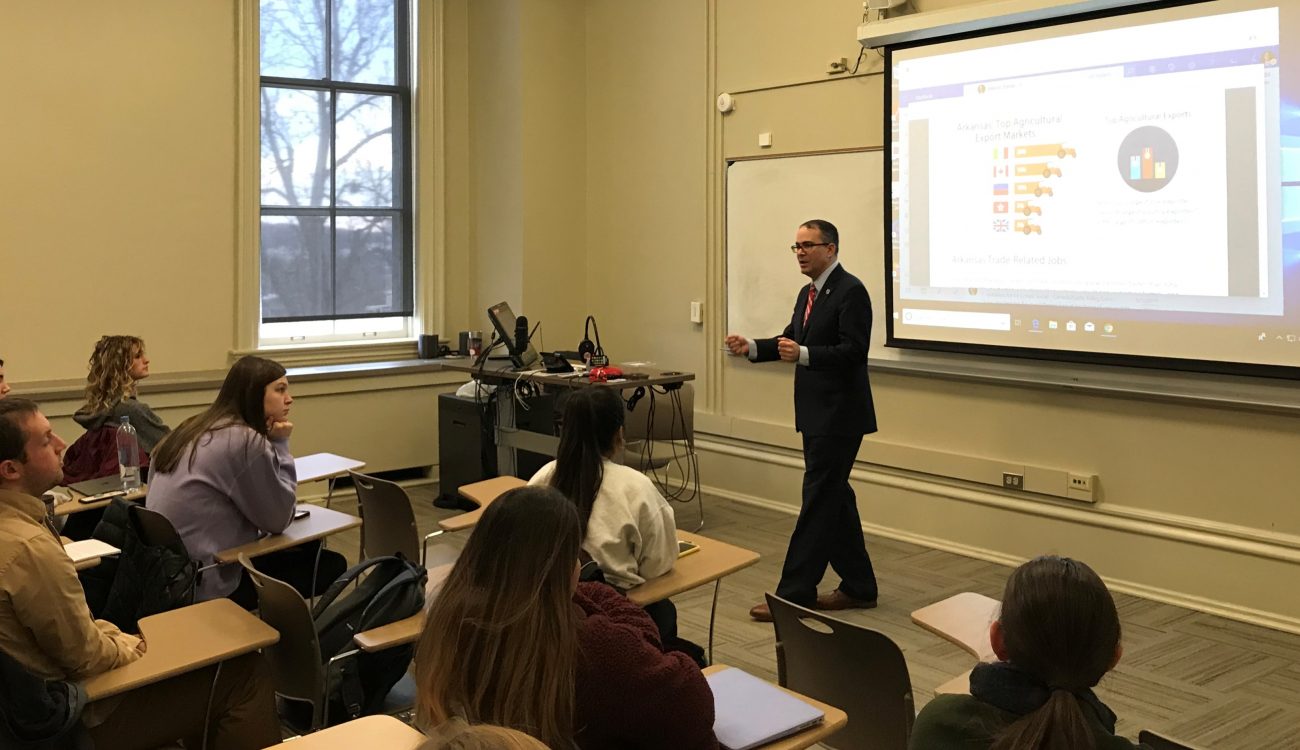
Regional Meeting Vital For Expanding Arkansas Exports In Latin America
November 27, 2019
Boozman Cites World Trade Center Arkansas Report In Push For USMCA Deal
December 6, 2019Analysis: Mexico Could Soon Be Arkansas’ Top Export Destination

Melvin Torres, director of Western Hemisphere trade at the World Trade Center Arkansas, speaks Tuesday, Dec. 3, to a group of U of A political science students about the thriving trade relationship between Arkansas and Mexico.
FAYETTEVILLE — Mexico could equal and may overtake Canada as Arkansas’ top customer in the next few years if the Latin American nation’s import patterns continue, according to Melvin Torres, director of Western Hemisphere trade at the World Trade Center Arkansas.
Speaking Tuesday, Dec. 3, to University of Arkansas students studying Mexican politics, Torres said Arkansas has commodities Mexico wants, and the country isn’t “changing its buying pattern.”
In 2018, Arkansas exported $870 million in goods to Mexico, which accounted for 14% of all exports, according to the Center’s 2019 report on jobs and trade.
The hard work of Arkansas’ farmers aided Mexico as well, with the country accounting for the majority of the state’s agricultural exports at 23%.
The North American Free Trade Agreement, or NAFTA, has also played a favorable role in establishing a thriving trade relationship between Arkansas and Mexico, Torres said.
Signed in 1994 by leaders from Canada, Mexico and the United States, NAFTA “tore down most trade barriers separating” the three countries, according to the Associated Press.
Since NAFTA’s implementation, Arkansas’ exports to Mexico have increased by more than 700% compared to just 300% with the rest of the world.
“In other words, Arkansas’ export growth rate to Mexico has been 2.3 times higher compared with the rest of the world,” Torres said.
Exports to Mexico in 2018 even increased slightly — by 2.3% — despite an overall dip in exports to the Western Hemisphere following new U.S. tariffs.
“It’s impressive because Mexico is considered a developing economy,” Torres said.
“As Mexico’s salaries grow, its purchasing power also grows.”
Eric McLain, a senior from Fort Smith, said he was aware of NAFTA’s impact nationally, but learned more about the agreement’s affect on Arkansas’ economy thanks to Torres.
“The fact that they’re still working together — despite the tariffs — is very interesting,” McLain said.
However, a revision to NAFTA, known as the U.S.-Mexico-Canada Agreement, has been in the works since last year, the AP reported.
President Trump signed the deal with leaders from both countries, but implementing USMCA still requires Congressional approval.
Despite under-performing in areas of inclusion and poverty reduction, the World Bank described Mexico as a “prime destination for investment” in its overview of the country.
“Mexico is a country with significant opportunities and potential,” the bank noted.
“Its macroeconomic stability is the cornerstone to foster investments and a growing private sector.”
Torres was invited to speak by Dr. Xavier Medina, who teaches a class on Mexican politics that touches the country’s role in North American relations.
Medina said Torres’ discussions “bridge the intersection” between Mexican politics and business.
“(Torres) helps students find Arkansas’ place in global trade, but also how it impacts the local community in Mexico.”
The mission of the World Trade Center Arkansas is to grow trade and increase Arkansas exports by connecting Arkansas businesses to the world through international trade services.
The Center is part of the University of Arkansas and serves as the trade promotion arm for the Arkansas Economic Development Commission.
For more information and valuable updates, please follow the Center on Facebook and Twitter or subscribe to the World Trade Center Arkansas newsletter.

